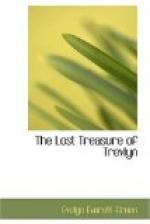“I know not. It seems scarce like; and yet I can never answer for my father’s moods, they are so wild and strange. But there is yet one thing more I would ask. You spoke awhile ago of gipsies—of a hatred they bore to our house. Tell me of that, I pray. Might it have somewhat to do with the stealing of the treasure?”
“That is what some have thought, though with what truth none can say. The story of that is soon told. Many long years agone now, the Trevlyn whose portrait hangs below in the hall—our great grandfather—gave sentence upon an old gipsy woman that she should be burnt as a witch. Men said of her that she had overlooked their children and their cattle: that the former had become sick or silly, and that the latter had incontinently died of diseases none had heard of before. There was such a hue and cry about her, and so many witnesses to testify the harm she had done, that all men held the case proven, and she was burnt in the sight of all the village out upon the common yonder by order of our forefather, whose office it was to see the law enforced. There were then many of these gipsy folk scattered about the common and forest, and this old witch belonged to them. They mustered strong upon the heath, and it was said that if the villagers had not been too strong for them they would have rescued the witch as she was led out to die. But the Trevlyns, when a thing has to be done, are wont to carry it through; and your grandfather, Cuthbert, was prepared against any such attempt, and the thing was done as had been decreed. The old woman went bravely to her death, but she turned as she passed Sir Richard and cursed him with a terrible curse. Later on some rude verses were found fastened to the wall of the church, and it was said by those who had heard the curse that these verses contained the same words. The paper was burnt by the haughty knight; but my grandam remembered some of the lines—she had got a sight of the paper—and used to tell them to us. I cannot recall them to memory now, but there was something about loss of gold and coming woe, years of strife and vengeful foe. And when years after the Trevlyn treasure was lost, there were many who vowed that it had been the work of the gipsy tribe, who had never forgotten or forgiven, and who had been waiting their turn to take vengeance upon the descendants of their old enemy.”
“It seems not unlike,” said Cuthbert, thoughtfully; “and if that be so, the treasure will most like be dissipated to the four winds by now. It would be divided amongst the tribe, and never be seen within the walls of Trevlyn again.”
“That I know not,” answered Kate, and she drew a little nearer to her cousin. “Cuthbert, dost thou believe in old saws? Dost thou believe those predictions which run in old families, and which men say work themselves out sometimes—in after generations?”
“I scarce know,” answered Cuthbert, “I hear so little and see so little. I know not why they should not be true. Men of old used to look into the future, and why not now? But why speakest thou thus, sweet cousin?”




